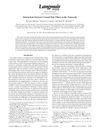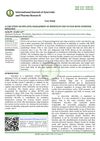 19 citations,
August 2019 in “Expert Opinion on Therapeutic Targets”
19 citations,
August 2019 in “Expert Opinion on Therapeutic Targets” New treatments for hair loss may target specific pathways and generate new hair follicles.
 April 2019 in “Advances in Cosmetic Surgery”
April 2019 in “Advances in Cosmetic Surgery” The document concludes that ongoing medical therapy is crucial for preventing hair loss, and surgical options can restore hair, with future treatments for hair loss being promising.
 1 citations,
August 2023 in “Advanced Drug Delivery Reviews”
1 citations,
August 2023 in “Advanced Drug Delivery Reviews” Microneedles are promising for long-acting drug delivery and can improve patient compliance, but more data is needed to confirm their effectiveness.
 September 2023 in “Deleted Journal”
September 2023 in “Deleted Journal” Post-bariatric surgery patients often face gastrointestinal issues, fatigue, dry skin, hair loss, and anxiety.
 10 citations,
November 2022 in “Protein & Cell”
10 citations,
November 2022 in “Protein & Cell” Quercetin significantly helps hair growth by activating hair follicles and improving blood vessel formation around them.
 December 2023 in “International Journal For Multidisciplinary Research”
December 2023 in “International Journal For Multidisciplinary Research” Indian medicinal plants can help with hair growth and common hair issues.
 155 citations,
May 2016 in “Nature communications”
155 citations,
May 2016 in “Nature communications” Memory T cells in the skin balance staying put and moving into the blood, clustering around hair follicles, and increasing in number after infection.
6 citations,
June 2021 in “EClinicalMedicine” ALRV5XR significantly improves hair density in women with hair loss and is well-tolerated.
 58 citations,
February 2016 in “Scientific reports”
58 citations,
February 2016 in “Scientific reports” Blocking BACE1 and BACE2 enzymes causes hair color loss in mice.
 April 2020 in “bioRxiv (Cold Spring Harbor Laboratory)”
April 2020 in “bioRxiv (Cold Spring Harbor Laboratory)” Skin healing from blisters can delay hair growth as stem cells focus on repairing skin over developing hair.
 February 2024 in “Journal of ayurveda and integrated medical sciences”
February 2024 in “Journal of ayurveda and integrated medical sciences” Ayurvedic medicine helped increase a young woman's hemoglobin levels and improved her anemia symptoms.
 29 citations,
December 2019 in “Stem Cells Translational Medicine”
29 citations,
December 2019 in “Stem Cells Translational Medicine” Fully regenerating human hair follicles not yet achieved.
 33 citations,
June 2017 in “Developmental Biology”
33 citations,
June 2017 in “Developmental Biology” Mice can correct hair follicle orientation without certain genes, but proper overall alignment needs those genes.
 January 1998 in “Lasers in Surgery and Medicine”
January 1998 in “Lasers in Surgery and Medicine” Lasers are effective and safe for various medical treatments, including cancer, wound healing, and skin conditions.
 24 citations,
June 2018 in “Reviews in endocrine and metabolic disorders”
24 citations,
June 2018 in “Reviews in endocrine and metabolic disorders” Thyroid diseases may contribute to autoimmune skin diseases, and more research is needed on their relationship.
 7 citations,
July 2015 in “Parasitology Research”
7 citations,
July 2015 in “Parasitology Research” Seresto® collar is safe to use with Advocate® and Profender® on dogs and cats.
 76 citations,
June 2015 in “Journal of biomedical science”
76 citations,
June 2015 in “Journal of biomedical science” Mutations in Gasdermin A3 cause skin inflammation and hair loss by disrupting mitochondria.
 16 citations,
February 2018 in “BMC Genomics”
16 citations,
February 2018 in “BMC Genomics” Certain genetic markers linked to reproductive potential were identified by their impact on a protein's ability to bind to genes.
 28 citations,
December 2010 in “Langmuir”
28 citations,
December 2010 in “Langmuir” Hair fibers interact through classical forces, which are influenced by treatments and products, important for hair care and other applications.
 2 citations,
May 2010 in “Actas Dermo-Sifiliográficas”
2 citations,
May 2010 in “Actas Dermo-Sifiliográficas” Home-use medical-cosmetic devices like lasers for hair removal may be convenient but need more research to confirm safety and effectiveness.
 September 2024 in “Current Oncology”
September 2024 in “Current Oncology” Docetaxel often causes hair loss, with limited effective treatments and no cure for permanent hair loss.
51 citations,
August 2012 in “Differentiation” Mouse genital development depends on male or female hormones for specific features.
 20 citations,
September 1978 in “International Journal of Dermatology”
20 citations,
September 1978 in “International Journal of Dermatology” Hair growth is influenced by factors like genetics and nutrition, and more research is needed to understand hair loss and growth mechanisms.
 24 citations,
May 2018 in “Journal of Molecular Endocrinology”
24 citations,
May 2018 in “Journal of Molecular Endocrinology” The spiny mouse is a unique menstruating rodent that can help us understand menstruation and reproductive disorders.
 8 citations,
December 2018 in “Journal of Dermatological Treatment”
8 citations,
December 2018 in “Journal of Dermatological Treatment” The PRP-like cosmetic with biomimetic peptides is potentially effective and safe for treating alopecia areata.
 October 2023 in “Biomaterials”
October 2023 in “Biomaterials” Nanotechnology could improve hair regrowth but faces challenges like complexity and safety concerns.
 17 citations,
April 2020 in “Dermatology and Therapy”
17 citations,
April 2020 in “Dermatology and Therapy” The PRP-like cosmetic product with postbiotics effectively treats hair loss in Alopecia areata.
 2 citations,
March 2015 in “Expert opinion on orphan drugs”
2 citations,
March 2015 in “Expert opinion on orphan drugs” New treatments for hair loss show promise but need more research to confirm safety and effectiveness.
 May 2023 in “International journal of Ayurveda and pharma research”
May 2023 in “International journal of Ayurveda and pharma research” Ayurvedic treatment helped a woman with PCOS conceive and deliver a healthy baby.
 11 citations,
January 1991 in “Urology”
11 citations,
January 1991 in “Urology” New hormonal treatments for enlarged prostate show promise for safer, effective non-surgical options.




























